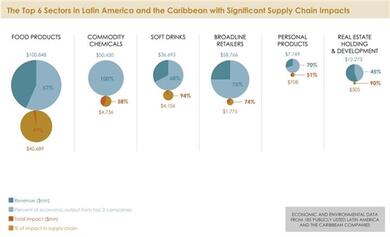Blogs Navigation
Sustainable BusinessRecent posts

Addressing gender-based violence from the private sector: the experience of Laboratorios Bagó
Francisco Méndez, CEO of the pharmaceutical company, shares his company's efforts and achievements in fostering an inclusive and safe work environment.

How Responsible Investments Can Empower Young Women and Girls in Miches While Boosting Tourism
In partnership with Fundación Tropicalia, IDB Invest fosters a more inclusive and sustainable growth path in the Dominican Republic by focusing on their untapped potential.

A Few Very Good Reasons to Protect the Integrity of Gender Bonds
Latin America and the Caribbean has become a leading region in gender bond issuance aimed at bolstering women’s empowerment. These instruments offer a promising capital market solution to mobilize funds towards projects that help accelerate parity.

Banks can make the world a better place — here’s how
* By Angela Miller When people are asked to name institutions they trust, banks rarely top the list. In fact, they don’t usually make it among the top five. According to the Edelman Trust Barometer, the financial sector is among the least trusted industries, a position it has held since the height of the global financial crisis in 2008.

A survival guide for business: The role of corporate governance and sustainability
By Rocío Budetta and Andrea Ortega Químicas Veterinarias is a small producer and distributor of veterinary products in Nicaragua. The Hoigjelle family founded the company in 1999, and since then it has met with success in this Central American country with a market of more than 120,000 micro, small, and medium-sized enterprises.

Greening corporate value chains lowers environmental impact and lifts competitiveness
By David Bloomgarden and Michael Hofmann Adidas, one of the world’s top two sportswear manufacturers, recently ended its business relationship with 13 of its Asian suppliers as a result of their severe or repeated noncompliance with labor, health, and safety workplace standards at their factories. This is one example of large multinational corporations working harder to demonstrate to their ever-more-demanding stakeholders that they operate sustainably. As a result, companies’ sustainability strategies are increasingly directly relevant to their operations—and are resulting in positive financial returns. An analysis of S&P 500 companies confirmed that businesses that have built sustainability into their core strategies achieve financial profitability that is significantly higher than that of their laggard peers—by between 18% and 67%.

Development finance institutions and private sector innovation
By Andre Averbug Development finance institutions (DFIs) can play an important role promoting innovation for increased competitiveness and sustained development in their client countries. Properly executed programs and projects can leverage private investment placement, develop local capital markets, improve resource allocation, as well as avoid moral hazard.

A Green Revolution under the Central American Sun: Solar energy in Honduras
[caption id="attachment_2625" align="alignleft" width="448"] Solar energy in Honduras: the roof of Embotelladora de Sula[/caption] The same sun that bathes Central America’s beaches is an increasingly valuable asset for many companies in the region. That is the case with the Honduran bottling plant Embotelladora de Sula, one of the largest rooftop photovoltaic projects in Latin America.

Three reasons why sustainability supports SME growth
Doing business these days is about more than just profitability. It’s also about sustainability, even for small and medium-sized enterprises (SMEs). Despite this, lots of SMEs are standing on the sidelines, hesitant to make investments in sustainability that don't guarantee an immediate return. So let's look at these three reasons to invest in SME sustainability initiatives:


